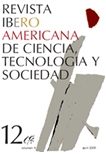Exploration of the University-Community Relationship in the Field of Organic Production in Argentina
DOI:
https://doi.org/10.52712/issn.1850-0013-866Keywords:
organic product, organic agriculture, organic farming, university-business relationAbstract
The growing demand of organic production at a world-wide level is seen as an opportunity for organic producers from developing countries. Although organic agriculture is seen as the sector with the biggest growth, it is widely accepted that the lack of institutional support in research and development, as well as in the training of agricultural assessors, constitutes a serious limitation to the expansion of this activity. The conditions in universities that tend to prioritize activities connected with research and development (R&D) and aimed at innovation, are determined increasingly by the advance of private financing; this constitutes an important limitation to the expansion of activities that respond to interests of medium and long term of a part of the wide spectrum that constitutes the farming sector. In this context, this work aims at exploring the current status of the university-business relation in the area of organic production in Argentina. Using two opinion surveys directed to faculties of Agronomic Sciences and Veterinary Medicine og local public and private universities, it was verified that R&D activities, as was well as the capacities acquired by the professionals during their undergraduate education, do not completely satisfy the demands of the productive sector.
Downloads
References
ACUÑA, P. (1993): “Vinculación Universidad - Sector Productivo”, Revista de La Educación Superior, nº 87, México, ANUIES.
ALBORNOZ, M. (2007): “La política científico y tecnológica como instrumento para el fomento de la cohesión social en Iberoamérica”, documento base presentado en el Encuentro Iberoamericano sobre Ciencia y Tecnología para el Desarrollo y la Cohesión Social en la Sociedad del Conocimiento, Ministerio de Educación y Ciencia de España, Madrid. Sitio web: http://www.oei.es/noticias/spip.php?article1266.
COLOMBATO, E. y MOAVRO, E. (1999): “Los orgánicos rumbo al tercer milenio”, Revista Alimentos Argentinos, nº 12, Buenos Aires. SAGPyA.
FAO (2003): Agricultura Orgánica, Ambiente y Seguridad Alimentaria, Roma, Nadia El-Hage Scialabba y Caroline Hattam Ed..
FAO (2002): “Agricultura Mundial: hacia los años 2015/2030”. Sitio web: http://www.fao.org/DOCREP/004/Y3557S/Y3557S00.HTM.
FIBL (2007): “Cooperación Internacional en Agricultura Orgánica”. Sitio web: http://www.fibl.org/espanol/cooperacion/index.php.
FIDA, RUTA, CATIE, FAO (2003): Memoria del Taller: Agricultura Orgánica: una herramienta para el desarrollo rural sostenible y la reducción de la pobreza, Costa Rica. Sitio web: http://www.fao.org/es/esc/common/ecg/30476_es_RUTAtaller.pdf.
HECHT, S. (1997): “La evolución del pensamiento agroecológico”, en Miguel Altieri: Agroecología: Bases Científicas para una agricultura sustentable, Lima, Centro de Investigación, Educación y Desarrollo (CIED).
NAIDORF, J. (2002): “En torno a la vinculación científico-tecnológica entre la Universidad, la Empresa y el Estado. Desarrollos teóricos de una agenda crítica”, Revista Fundamentos en Humanidades, año III, nº 1-2, pp. 7-22, Universidad Nacional de San Luis.
OEA (2005): Ciencia, tecnología, ingeniería e innovación para el desarrollo: una visión para las Américas en el siglo XXI, OEA-OECT, 2º ed.
PAULUK, M. (2007): “Universidad, industria y gobierno local”, Revista OIDLES, vol. 1, nº 1.
RUIZ, M. et al (2006): “Diagnóstico de las conductas innovativas de las cadenas productivas de la región de influencia de la Universidad Nacional del Litoral”, resumen presentado en el encuentro Relación Universidad-Entorno Socio-productivo -Estado”, Salta. Sitio web: http://www.emprendedorxxi.coop/DocumentosWeb/redVITEC/39.pdf
SENASA (2007): “Situación de la Producción Orgánica en la Argentina durante el año 2006”. Sitio web: http://www.senasa.gov.ar/Archivos/File/File827-2006.pdf.
UNESCO (1999): “Declaración de Santo Domingo - La ciencia para el siglo XXI: una nueva visión y un marco de acción”. Sitio web: http://www.unesco.org.uy/ciencias-basicas/cmc-99/sdom.pdf.
WHEELER, S. A. (2007): “What influences agricultural professionals’ views towards organic agriculture?”, Ecological Economics. Sitio web: http://www.sciencedirect.com.
YUSSEFI, M. y MILLER, H. (2007): The World of Organic Agriculture - Statistics and Emerging Trends, Bonn, IFOAM. Sitio web: http://www.soel.de
Downloads
Published
How to Cite
Issue
Section
License
Copyright (c) 2025 CC Attribution 4.0

This work is licensed under a Creative Commons Attribution 4.0 International License.
All CTS's issues and academic articles are under a CC-BY license.
Since 2007, CTS has provided open and free access to all its contents, including the complete archive of its quarterly edition and the different products presented in its electronic platform. This decision is based on the belief that offering free access to published materials helps to build a greater and better exchange of knowledge.
In turn, for the quarterly edition, CTS allows institutional and thematic repositories, as well as personal web pages, to self-archive articles in their post-print or editorial version, immediately after the publication of the final version of each issue and under the condition that a link to the original source will be incorporated into the self-archive.











